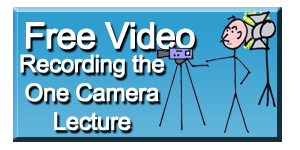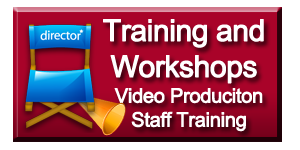 Last week I was at a planning meeting for the TEDxRainier event this coming fall in Seattle. One thing that Phil Klein, the events coordinator said that stuck with me was that each speaker for the event must agree to be coached. I have already blogged about how I think TED does a good job when it comes to videotaping lectures for distribution online and this just illustrated why they are doing a good job. Many people may be wondering why they would need to coach a speaker before they video tape them. The speaker already knows what they are talking about. How can they be coached? Let’s look at 5 things you should go over with every speaker or lecturer that you video tape.
Last week I was at a planning meeting for the TEDxRainier event this coming fall in Seattle. One thing that Phil Klein, the events coordinator said that stuck with me was that each speaker for the event must agree to be coached. I have already blogged about how I think TED does a good job when it comes to videotaping lectures for distribution online and this just illustrated why they are doing a good job. Many people may be wondering why they would need to coach a speaker before they video tape them. The speaker already knows what they are talking about. How can they be coached? Let’s look at 5 things you should go over with every speaker or lecturer that you video tape.
When to start and stop: Lectures are usually recorded either in a controlled setting like a studio or in a live event. Make sure the speaker knows when they should start to speak. The cameras need to be recording and everyone needs to be ready. During a live event there is nothing more embarrassing then stopping the speaker and asking them to start over. Everyone, including the speaker should know when the lecture is going to start. The length of the lecture should be decided beforehand. If the timing is critical, for example the lecture cannot be longer than 15 minutes, the talk should be rehearsed and a way to tell the speaker when to end, with a clock or hand signals, should be established. How the speaker will end the talk should be rehearsed so that it is smooth and effective.
Graphics, Slides and Visuals: Work out beforehand what visuals will be used. Are they in the appropriate format for video? Will they be legible to the viewer? If not can you fix them before the recording? How will you record them and when will the speaker use them? Has copyright been cleared? Will the speaker be using props? Deal with all of this before the day of the lecture so there will be no surprises. Rehearse any demonstrations.
Microphones and Audio: Does the speaker know how to use the microphone? Will they have a chance to practice with the microphone? Will you have an opportunity to set the audio levels? Will there be other speakers? Will there be a Question and Answer session? Will the audience have a microphone? Will audio come from other sources such as video playback or music? What will you do when the microphone fails? Have the speaker rehearse and do a sound check.
Lighting: Is there enough light to make a good image? Is the speaker aware of the lighting needs? Get the speaker to practice with the lights on so they know what it will be like. Does the speaker pace while on stage? Will they stay in the light? Does the light spill on the projection screen? Does it bother the audience? Have the speaker rehearse with the lights and the cameras.
Clothing: Is the speaker dressed appropriately for videotaping? Will it be difficult to attach a microphone? Does jewelry clink and clank and make distracting noise? Are the clothes too bright or cumbersome? Will the speaker need make up? Is the makeup they are using appropriate? Have the speaker wear the appropriate clothes at the rehearsal.
The best thing to do is meet with the speaker before the day of the lecture and go through all of these areas. If you really want a polished and effective finished video then have the speaker rehearse their talk on camera. Record the lecture and review it with them. Help them refine their talk, be more concise, tell a story and feel more comfortable on camera. Going over these five areas will greatly improve the speaker’s performance and the final videotaped program.
Tell us below what you do to prepare your speakers to be videotaped. What did you think of the suggestions above?
You can see a short video I produced a few years ago for the University of Washington covering many of these same points called the Talent Zone. Follow this link if you would like to know more about how Image Media Partners can help you with your online video plan.
Photo Credit: UWTV




